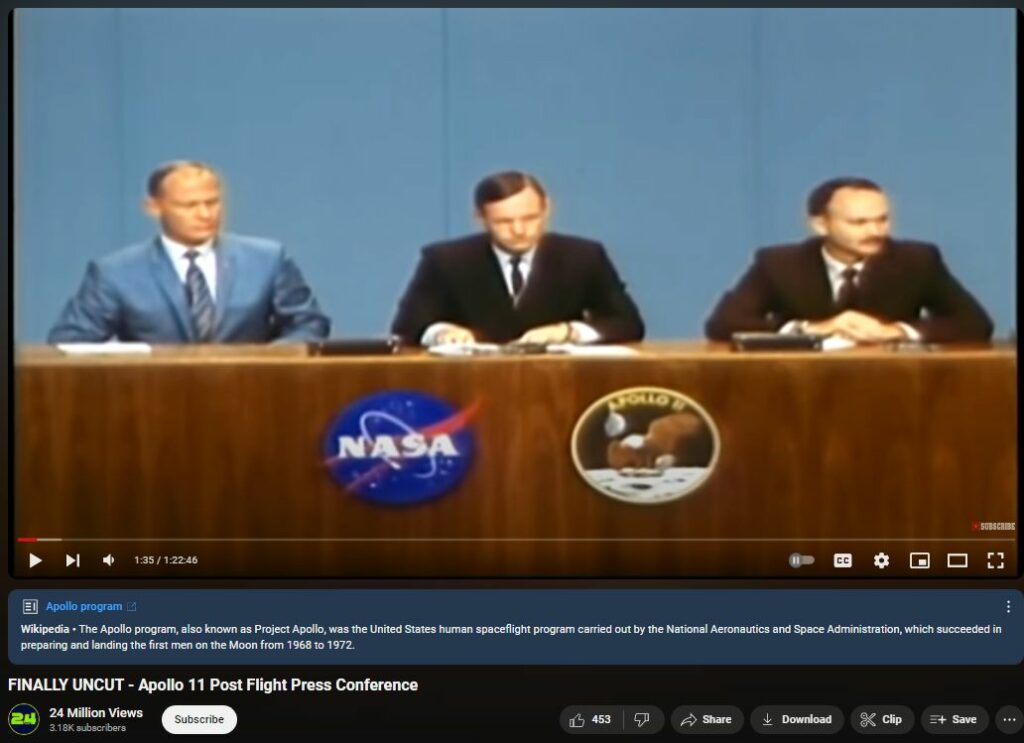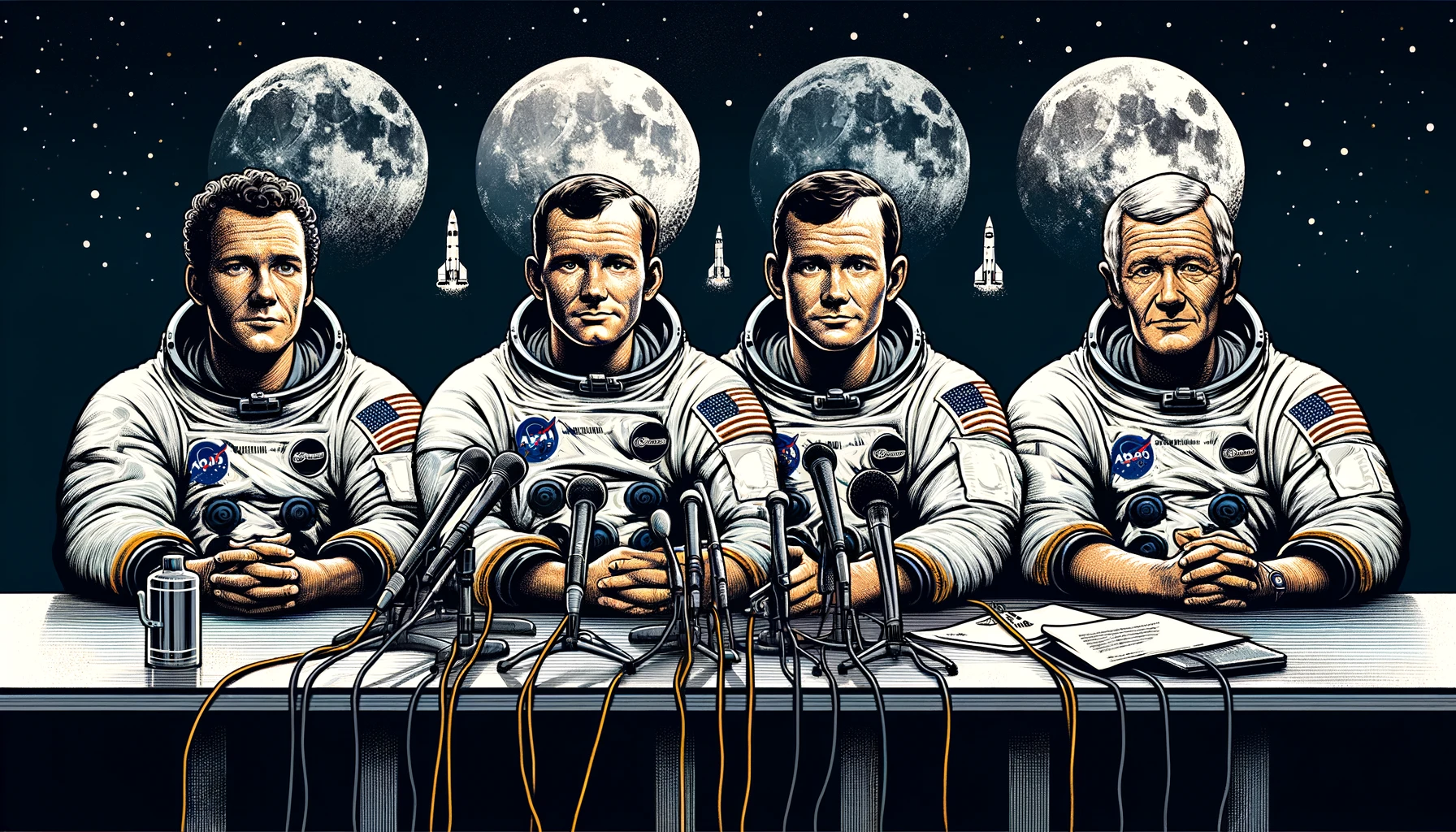LUNARCY – Psychotic Post-Landing Press-Conference and Interview Analysis
Not one single genuine smile of pride in accomplishment. Not one.
Guilt-ridden. Troubled. High-tension. Uncertainty. Misgivings galore ozzing from culprits, er, participants. There is good reason Neil Armstrong refused interviews for the rest of his life. The two that he did give have been analyzed and found frought with deception, distancing, and discombobulation.
the exact same face and attitude I have when I have to lie about something at work to save my supervisor

The Apollo 11 Psychotic Post-Landing Press Conference: Analyzing the Stoic Demeanor of the Astronauts
Introduction
The Apollo 11 mission, which culminated in the historic moon landing on July 20, 1969, remains one of the most celebrated achievements in human history. However, the post-landing press conference held by astronauts Neil Armstrong, Buzz Aldrin, and Michael Collins has been the subject of much scrutiny and speculation. Notably, none of the astronauts displayed genuine smiles or overt pride during the event. In this blog post, we explore the stoic, non-smiling demeanor of the Apollo 11 astronauts and consider the possible reasons behind their subdued expressions, including the weight of personal responsibility, the fear of discovery, and the uncertainty of their roles in what some believe to be a grand deception by NASA.
The Stoic Demeanor of the Astronauts
The Apollo 11 post-landing press conference, held on August 12, 1969 in Houston, Texas, presented the world with three astronauts who appeared unusually reserved and stoic. Neil Armstrong, Buzz Aldrin, and Michael Collins, despite their monumental achievement, showed little of the exuberance and pride one might expect from individuals who had just completed such a historic mission. Their demeanor was characterized by serious expressions, limited smiles, and a notable lack of celebratory behavior.
Possible Explanations for the Demeanor
- The Weight of Personal Responsibility:
- The astronauts were keenly aware of the immense responsibility placed upon them. As representatives of NASA and the United States, they carried the weight of national pride and scientific achievement on their shoulders. This burden might have contributed to their serious demeanor, as they felt the need to maintain a professional and composed image in front of the world.
- Fear of Discovery:
- Another theory posits that the astronauts’ stoic expressions were a result of fear—fear of the unknown, fear of the mission’s success being scrutinized, and fear of potential failure. The moon landing was a highly complex and dangerous endeavor, and the possibility of mistakes or unexpected consequences might have weighed heavily on their minds.
- Uncertainty of Their Roles:
- The astronauts’ subdued demeanor could also be attributed to uncertainty about their roles in the mission. Some conspiracy theorists argue that the moon landing was a grand deception orchestrated by NASA. According to this perspective, the astronauts might have been uncertain about the authenticity of their mission and the potential repercussions of their actions. This uncertainty could have led to a lack of genuine smiles and a more reserved demeanor.
- Psychological and Emotional Stress:
- The psychological and emotional stress of the mission and its aftermath cannot be understated. The intense scrutiny from the media, the public, and their peers, coupled with the pressure to perform flawlessly, might have left the astronauts emotionally drained and unable to exhibit the typical joy and pride expected in such a momentous occasion.
Conclusion
The Apollo 11 post-landing press conference remains a fascinating subject for analysis and speculation. The stoic, non-smiling demeanor of astronauts Neil Armstrong, Buzz Aldrin, and Michael Collins has led to various interpretations, ranging from the weight of personal responsibility and fear of discovery to uncertainty about their roles in a possible grand deception. Whether due to the immense pressure of their mission, the emotional toll of their experiences, or deeper uncertainties, the demeanor of the Apollo 11 astronauts continues to intrigue and inspire debate.
Interview Analysis by Richard D Hall

Notice NASA logo includes serpent’s forked tongue, a warning from scripture. Apparently They can’t resist the mockery.
Importantly, VIRUS means snake-bite venom; VATICAN means snake-pit. (Bill Hughes)
By 1987, significant advancements had been made in virology, including the “discovery” and characterization of many viruses, the development of vaccines (such as those for polio and smallpox), and the identification of viruses as causative agents of various diseases. Though no in-situ photographs of viruses of any kind exist, the field of “molecular biology” is claimed to have been rapidly evolving, providing deeper insights into theorized viral structures and supposed mechanisms of infection. HIV/AIDS research was also a major focus at this time due to the claimed ongoing epidemic.
By 1987, Dr Anthony Fauci, deeply Jesuit-trained and Vatican-funded, was already in-place at NIH/NIAID, to-date across 40 years, or 10 US Presidential regimes.
Historically known as poisoners and far too long “in-charge” of “higher-education”, Jesuits exist to “counter” the Protestant Reformation per an oath (said to appear in Congressional Record) to “extirpate” all non-Catholic heretics. American citizenry has always been largely Protestant; most of the world is non-Catholic. Has not America and most of the world been poisoned by recent Jesuit / Vatican intrigue?
Don’t be fooled or short-sighted: Everything connects in this intrigue of undoing.
